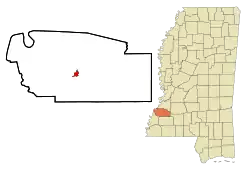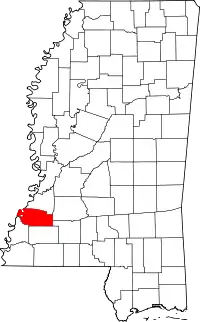Fayette, Mississippi
Fayette is a city in Jefferson County, Mississippi, United States. The population was 1,614 at the 2010 census. It is the county seat of Jefferson County.[3]
Fayette, Mississippi | |
|---|---|
 Location of Fayette, Mississippi | |
 Fayette, Mississippi Location in the United States | |
| Coordinates: 31°42′40″N 91°3′44″W | |
| Country | United States |
| State | Mississippi |
| County | Jefferson |
| Government | |
| • Type | Mayor-Alderman |
| • Mayor | Londell Eanochs |
| Area | |
| • Total | 1.18 sq mi (3.04 km2) |
| • Land | 1.18 sq mi (3.04 km2) |
| • Water | 0.00 sq mi (0.00 km2) |
| Elevation | 282 ft (86 m) |
| Population (2010) | |
| • Total | 1,614 |
| • Estimate (2019)[2] | 1,436 |
| • Density | 1,221.09/sq mi (471.61/km2) |
| Time zone | UTC-6 (Central (CST)) |
| • Summer (DST) | UTC-5 (CDT) |
| ZIP codes | 39069, 39081 |
| Area code(s) | 601 |
| FIPS code | 28-24500 |
| GNIS feature ID | 0669927 |
| Website | Town of Fayette |
Geography
Fayette is located at 31°42′40″N 91°3′44″W (31.711144, -91.062246).[4]
According to the United States Census Bureau, the city has a total area of 1.2 square miles (3.1 km2), all land.
History
In 1879, the Jesse James gang, based in Missouri, raided southwest Mississippi, robbing a store each in Washington and Fayette. The outlaws absconded with $2,000 cash in the second robbery and took shelter in abandoned cabins on the Kemp Plantation south of St. Joseph, Louisiana. A posse attacked and killed two of the outlaws but failed to capture the entire gang.[5] Jesse James and most of his gang succeeded in returning to Missouri. He was killed three years later in 1882 at his house in St. Joseph in northwestern Missouri.
In 1890, the white Democrat-controlled Mississippi legislature passed a new constitution, which effectively disenfranchised most blacks in the state,[6] crippling their integration into society and the Republican Party of the time. After Congressional passage of the Voting Rights Act of 1965, blacks began to register and vote again. Charles Evers was elected as mayor in 1969 by the people of Fayette; he was the first African-American mayor elected in post-Reconstruction Mississippi.[7] He beat the white incumbent R.G. Allen by 386–225. Evers was an activist and the brother of slain civil rights leader Medgar Evers, head of the Mississippi chapter of the NAACP when he was assassinated in 1963.[8]
Demographics
| Historical population | |||
|---|---|---|---|
| Census | Pop. | %± | |
| 1850 | 210 | — | |
| 1860 | 339 | 61.4% | |
| 1870 | 120 | −64.6% | |
| 1880 | 369 | 207.5% | |
| 1900 | 604 | — | |
| 1910 | 775 | 28.3% | |
| 1920 | 840 | 8.4% | |
| 1930 | 848 | 1.0% | |
| 1940 | 907 | 7.0% | |
| 1950 | 1,498 | 65.2% | |
| 1960 | 1,626 | 8.5% | |
| 1970 | 1,725 | 6.1% | |
| 1980 | 2,033 | 17.9% | |
| 1990 | 1,853 | −8.9% | |
| 2000 | 2,242 | 21.0% | |
| 2010 | 1,614 | −28.0% | |
| 2019 (est.) | 1,436 | [2] | −11.0% |
| U.S. Decennial Census[9] | |||
As of the census[10] of 2000, there were 2,242 people, 775 households, and 543 families residing in the city. The population density was 1,903.3 people per square mile (733.6/km2). There were 843 housing units at an average density of 715.6 per square mile (275.8/km2). The racial makeup of the city was 97.37% African American, 1.92% White, 0.09% Native American, 0.22% Asian, and 0.40% from two or more races. Hispanic or Latino of any race were 0.62% of the population.
There were 775 households, out of which 39.6% had children under the age of 18 living with them, 24.4% were married couples living together, 40.3% had a female householder with no husband present, and 29.9% were non-families. 27.2% of all households were made up of individuals, and 9.8% had someone living alone who was 65 years of age or older. The average household size was 2.82 and the average family size was 3.46.
In the city, the population was spread out, with 34.2% under the age of 18, 12.6% from 18 to 24, 25.6% from 25 to 44, 17.2% from 45 to 64, and 10.4% who were 65 years of age or older. The median age was 28 years. For every 100 females, there were 75.6 males. For every 100 females age 18 and over, there were 69.1 males.
The median income for a household in the city was $13,564, and the median income for a family was $16,875. Males had a median income of $20,500 versus $17,011 for females. The per capita income for the city was $8,101. About 44.4% of families and 48.2% of the population were below the poverty line, including 58.8% of those under age 18 and 38.2% of those age 65 or over.
Education
The City of Fayette is served by the Jefferson County School District.
Notable people
- Charles Evers - first post-Reconstruction African-American mayor in Mississippi
- Treveon Fulton - Youngest Mayoral candidate of Fayette at age 18.
- Richard H. Truly - Eighth NASA administrator
- Thomas M. Wade - Louisiana politician and educator, was born in 1860 at Point Prospect Plantation near Fayette.[11]
References
- "2019 U.S. Gazetteer Files". United States Census Bureau. Retrieved July 26, 2020.
- "Population and Housing Unit Estimates". United States Census Bureau. May 24, 2020. Retrieved May 27, 2020.
- "Find a County". National Association of Counties. Archived from the original on May 3, 2015. Retrieved 2011-06-07.
- "US Gazetteer files: 2010, 2000, and 1990". United States Census Bureau. 2011-02-12. Retrieved 2011-04-23.
- "Jefferson B. Snyder". New Orleans Times-Picayune, April 15, 1938. Retrieved July 22, 2013.
- "Nov. 1, 1890: Mississippi Constitution". Zinn Education Project. Retrieved 2020-07-23.
- "Evers, Charles – MS Civil Rights Project". Retrieved 2020-07-23.
- Associated Press (14 May 1969). "Race Won By Evers". Waycross Journal-Herald. Retrieved 25 November 2012.
- "Census of Population and Housing". Census.gov. Retrieved June 4, 2015.
- "U.S. Census website". United States Census Bureau. Retrieved 2008-01-31.
- "Thomas M. Wade". records.ancestry.com. Retrieved July 17, 2013.
